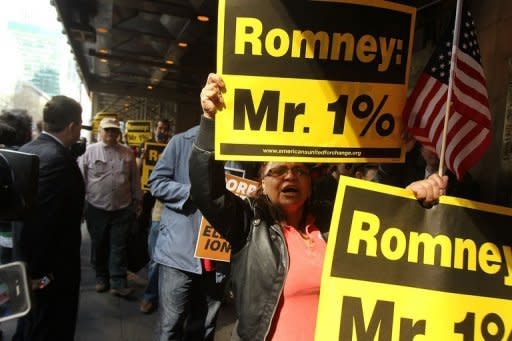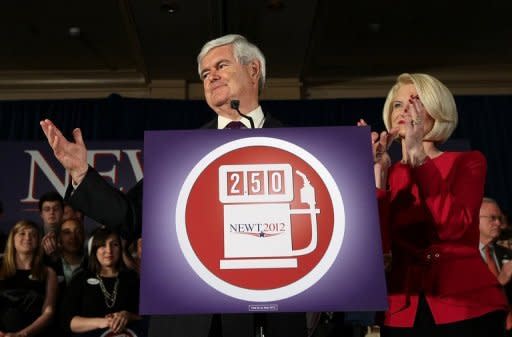Republican race shifts to Obama's home state
Republican White House hopefuls will Friday set their sights on President Barack Obama's home state of Illinois, hoping to gain momentum and become the party's standard bearer in the general election. Former senator Rick Santorum is aiming to win again as polls show him within striking range of frontrunner Mitt Romney, who has a big lead in all-important delegates but who has been dented by several failures to kill off his rivals. Santorum, a devout Catholic and opponent of abortion and gay marriage, is seen as the most conservative Republican candidate vying to take on Democrat Obama on November 6, but his ability to win over independent voters is doubted. A Santorum victory in this midwestern, industrialized state on Tuesday could consequently prove a far more significant upset than his wins in the Deep South states of Alabama and Mississippi, where evangelical voters carry more weight. It would also give Santorum important momentum going into the southern state of Louisiana's primary on March 24 and contests in Wisconsin, Maryland and Washington DC on April 3. The former Pennsylvania senator is making an aggressive push in Illinois, adding many campaign stops and launching ads attacking Romney for raising taxes and supporting the Wall Street bailout and government control of healthcare. "It's time conservatives take a stand," Santorum said in a fundraising note to supporters on Thursday. "I am convinced that whoever can activate grassroots activists will not only win the nomination but have the honor of defeating Barack Obama," he added, in a likely dig at Romney's big-spending campaign. Romney has responded by moving up plans to campaign in Illinois -- squeezing in an appearance early Friday before he flies to Puerto Rico ahead of caucuses there Sunday and pouring millions of dollars into ads for the local airwaves. "I've got a real strong lead and that's because I've gotten a million more votes than Rick Santorum has," Romney told Fox News on Thursday. "The reason that's happened is because I've been talking about the economy and getting people back to work." While the Republicans have until now controlled the 2012 race for the White House, Obama's decision to wade in Thursday signaled that his party, sensing a tight election, is upping their effort to gain traction with voters. Obama mocked Republicans who oppose his energy plans as "naysayers" on a day his reelection campaign released a laudatory 17-minute documentary, narrated by Oscar-winning actor and Democrat supporter Tom Hanks, on his presidency. Vice President Joe Biden threw even sharper barbs during a major campaign trip to the crucial battleground and swing state of Ohio where he called out the remaining Republican contenders by name. "If you give any one of these guys the keys to the White House, they will bankrupt the middle class again," Biden told a crowd of union workers, alluding to the global economic crisis that occurred during the last Republican government, and which prompted US unemployment to rise massively. The campaign's new intensity comes at a moment of high volatility in American politics, with Obama's approval rating lurching up and down in several polls, partly influenced by rising gasoline prices. But the consistently divisive Republican race has been an unexpected boon for Obama and it could continue for weeks if not months to come. Former House speaker Newt Gingrich has vowed to take the battle all the way to the Republican convention in August, ignoring increasing pressure to drop out and consolidate the conservative vote behind Santorum. The proportional distribution of delegates will make it difficult for Romney to reach the magic number of 1,144 before May or even June. For the same reason, Santorum also is unlikely to capture enough delegates to clinch the nomination, but he could win enough to justify a brokered convention. Libertarian Ron Paul -- who has not won a single contest -- also continues to collect delegates and remains in the race thanks to a core group of supporters. The fight to win over the party's conservative base has revived the divisive culture war over issues such as abortion, gay marriage and even access to birth control, where voters sense an ideological gap between Santorum and Romney. It has also pushed Romney, seen by many part die-hards as a moderate, former governor of liberal Massachusetts, to take positions that may put off centrists and independents who are crucial to winning a general election.



